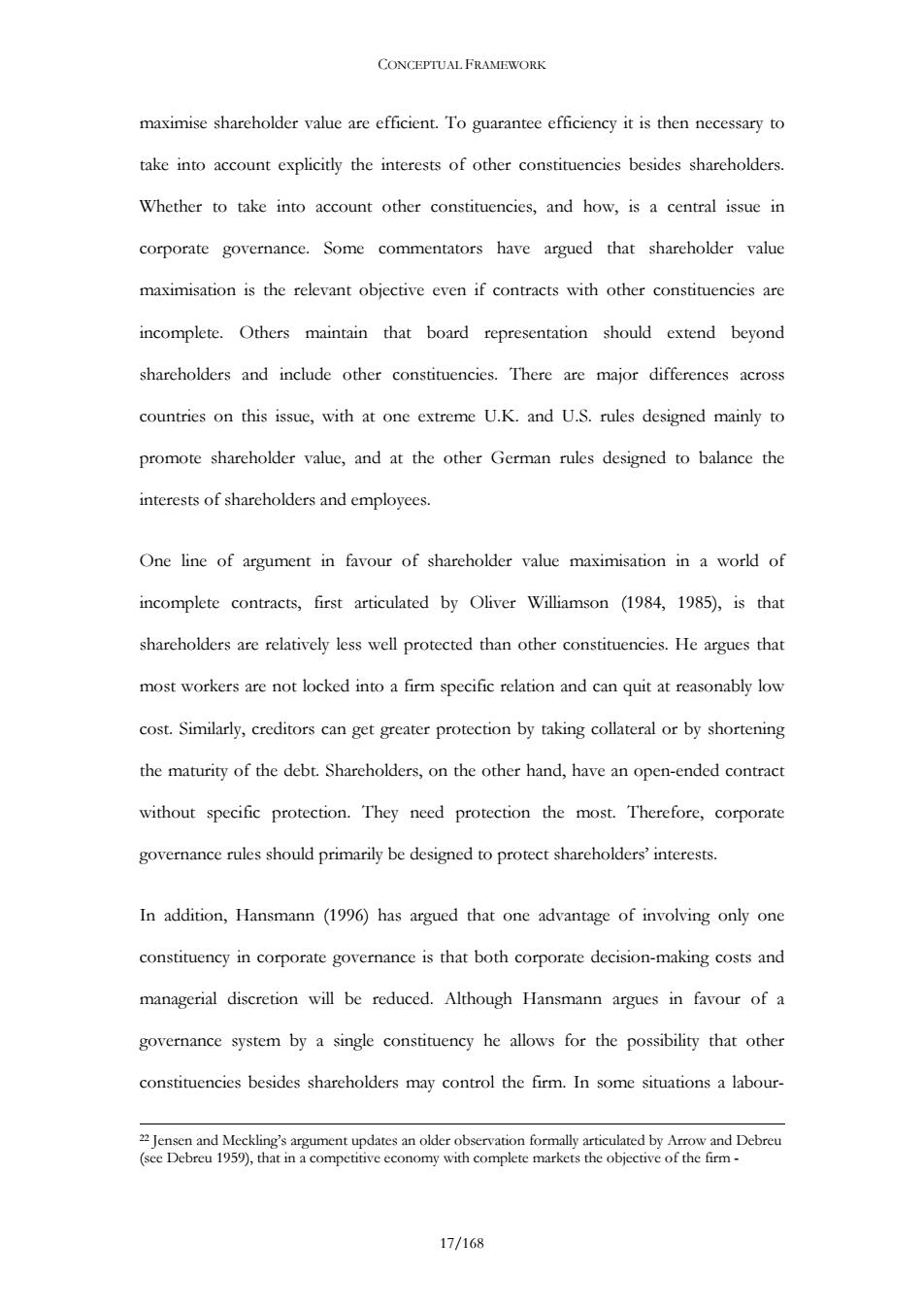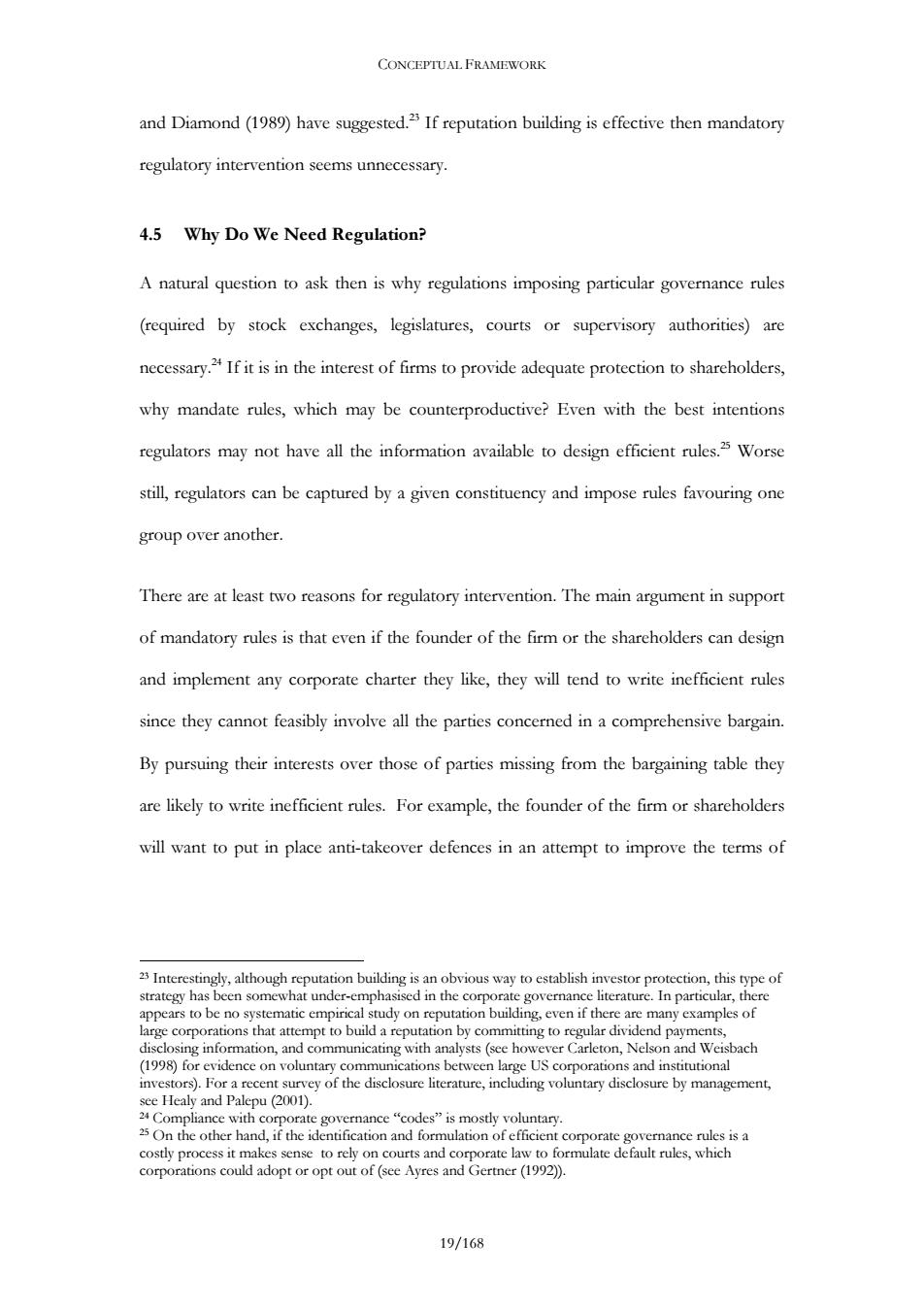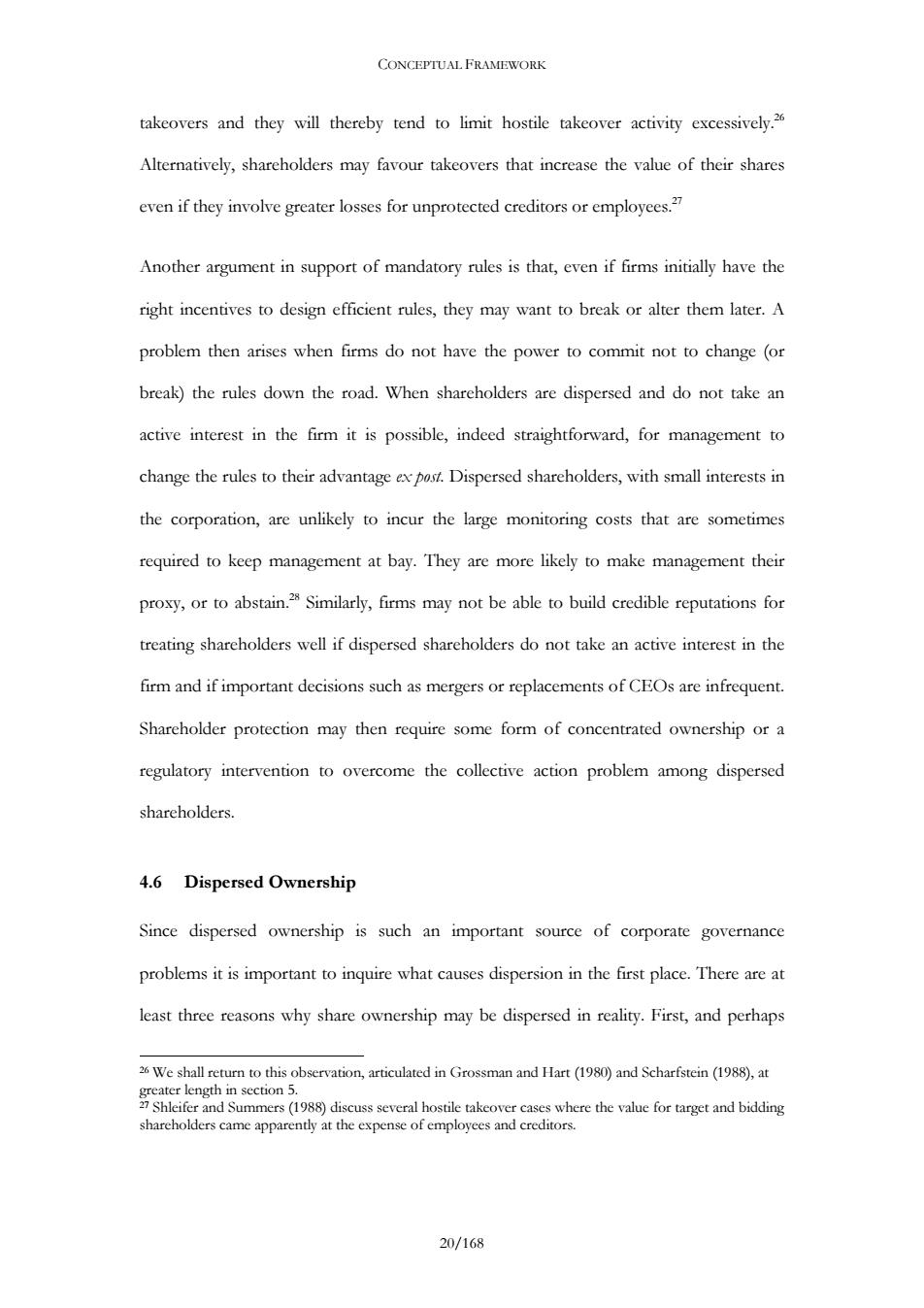
CONCEPTUAL FRAMEWORK 4.3 Shareholder Value An efficiency criterion that is often advocated in finance and legal writings on corporate governance is"shareholder value",or the stock market valuation of the corporation.An important basic question is how this notion is related to Pareto efficiency or surplus maximization.Is maximisation of shareholder value synonymous with either or both notions of efficiency? One influential view on this question (articulated by Jensen and Meckling,1976)is the following.If a)the firm is viewed as a nexus of complete contracts with creditors, employees,clients,suppliers,third and other relevant parties,b)only contracts with shareholders are open-ended;that is,only shareholders have a claim on residual returns after all other contractual obligations have been met,and c)there are no agency problems,then maximisation of(residual)shareholder value is tantamount to economic efficiency.Under this scenario,corporate governance rules should be designed to protect and promote the interests of shareholders exclusively.22 As Jensen and Meckling point out,however,managerial agency problems produce inefficiencies when CEOs act only in the interest of shareholders.There may be excess risk-taking when the firm is highly levered,or,as Myers (1977)has shown,debt overhang may induce underinvestment.Either form of investment inefficiency can be mitigated if managers do not exclusively pursue shareholder value maximisation. 4.4 Incomplete Contracts and Multiple Constituencies Contracts engaging the corporation with parties other than shareholders are generally incomplete,so that there is no guarantee that corporate governance rules designed to 16/168
CONCEPTUAL FRAMEWORK 4.3 Shareholder Value An efficiency criterion that is often advocated in finance and legal writings on corporate governance is “shareholder value”, or the stock market valuation of the corporation. An important basic question is how this notion is related to Pareto efficiency or surplus maximization. Is maximisation of shareholder value synonymous with either or both notions of efficiency? One influential view on this question (articulated by Jensen and Meckling, 1976) is the following. If a) the firm is viewed as a nexus of complete contracts with creditors, employees, clients, suppliers, third and other relevant parties, b) only contracts with shareholders are open-ended; that is, only shareholders have a claim on residual returns after all other contractual obligations have been met, and c) there are no agency problems, then maximisation of (residual) shareholder value is tantamount to economic efficiency. Under this scenario, corporate governance rules should be designed to protect and promote the interests of shareholders exclusively. 22 As Jensen and Meckling point out, however, managerial agency problems produce inefficiencies when CEOs act only in the interest of shareholders. There may be excess risk-taking when the firm is highly levered, or, as Myers (1977) has shown, debt overhang may induce underinvestment. Either form of investment inefficiency can be mitigated if managers do not exclusively pursue shareholder value maximisation. 4.4 Incomplete Contracts and Multiple Constituencies Contracts engaging the corporation with parties other than shareholders are generally incomplete, so that there is no guarantee that corporate governance rules designed to 16/168

CONCEPTUAL FRAMEWORK maximise shareholder value are efficient.To guarantee efficiency it is then necessary to take into account explicitly the interests of other constituencies besides shareholders. Whether to take into account other constituencies,and how,is a central issue in corporate governance.Some commentators have argued that shareholder value maximisation is the relevant objective even if contracts with other constituencies are incomplete.Others maintain that board representation should extend beyond shareholders and include other constituencies.There are major differences across countries on this issue,with at one extreme U.K.and U.S.rules designed mainly to promote shareholder value,and at the other German rules designed to balance the interests of shareholders and employees. One line of argument in favour of shareholder value maximisation in a world of incomplete contracts,first articulated by Oliver Williamson (1984,1985),is that shareholders are relatively less well protected than other constituencies.He argues that most workers are not locked into a firm specific relation and can quit at reasonably low cost.Similarly,creditors can get greater protection by taking collateral or by shortening the maturity of the debt.Shareholders,on the other hand,have an open-ended contract without specific protection.They need protection the most.Therefore,corporate governance rules should primarily be designed to protect shareholders'interests. In addition,Hansmann (1996)has argued that one advantage of involving only one constituency in corporate governance is that both corporate decision-making costs and managerial discretion will be reduced.Although Hansmann argues in favour of a governance system by a single constituency he allows for the possibility that other constituencies besides shareholders may control the firm.In some situations a labour- 22 Jensen and Meckling's argument updates an older observation formally articulated by Arrow and Debreu (see Debreu 1959),that in a competitive economy with complete markets the objective of the firm- 17/168
CONCEPTUAL FRAMEWORK maximise shareholder value are efficient. To guarantee efficiency it is then necessary to take into account explicitly the interests of other constituencies besides shareholders. Whether to take into account other constituencies, and how, is a central issue in corporate governance. Some commentators have argued that shareholder value maximisation is the relevant objective even if contracts with other constituencies are incomplete. Others maintain that board representation should extend beyond shareholders and include other constituencies. There are major differences across countries on this issue, with at one extreme U.K. and U.S. rules designed mainly to promote shareholder value, and at the other German rules designed to balance the interests of shareholders and employees. One line of argument in favour of shareholder value maximisation in a world of incomplete contracts, first articulated by Oliver Williamson (1984, 1985), is that shareholders are relatively less well protected than other constituencies. He argues that most workers are not locked into a firm specific relation and can quit at reasonably low cost. Similarly, creditors can get greater protection by taking collateral or by shortening the maturity of the debt. Shareholders, on the other hand, have an open-ended contract without specific protection. They need protection the most. Therefore, corporate governance rules should primarily be designed to protect shareholders’ interests. In addition, Hansmann (1996) has argued that one advantage of involving only one constituency in corporate governance is that both corporate decision-making costs and managerial discretion will be reduced. Although Hansmann argues in favour of a governance system by a single constituency he allows for the possibility that other constituencies besides shareholders may control the firm. In some situations a labour- 22 Jensen and Meckling’s argument updates an older observation formally articulated by Arrow and Debreu (see Debreu 1959), that in a competitive economy with complete markets the objective of the firm - 17/168

CONCEPTUAL FRAMEWORK managed firm,a customer co-operative,or possibly a supplier co-operative may be a more efficient corporate governance arrangement.In his view,determining which constituency should govern the firm comes down to identifying which has the lowest decision making costs and which has the greatest need of protection. An obvious question raised by Williamson's argument is that if it is possible to get better protection by signing debt contracts,why not encourage all investors in the firm to take out debt contracts.Why worry about protecting shareholders when investors can find better protection by writing a debt contract?Jensen (1986,1989)has been a leading advocate of this position,arguing that the best way to resolve the agency problem between the CEO and investors is to have the firm take on as much debt as possible. This would limit managerial discretion by minimising the "free cash-flow"available to managers and,thus,would provide the best possible protection to investors. The main difficulty with Jensen's logic is that highly levered firms may incur substantial costs of financial distress.They may face direct bankruptcy costs or indirect costs in the form of debt-overhang (see Myers,1977 or Hart and Moore 1995 and Hennessy and Levy 2002).To reduce the risk of financial distress it may be desirable to have the firm rely partly on equity financing.And to reduce the cost of equity capital it is clearly desirable to provide protections to shareholders through suitably designed corporate governance rules. Arguably it is in the interest of corporations and their CEOs to design efficient corporate governance rules,since this would minimise their cost of capital,labour and other inputs. It would also maximise the value of their products or services to their clients.Firms may want to acquire a reputation for treating shareholders or creditors well,as Kreps(1990) unanimously espoused by all claimholders-is profit (or value)maximization. 18/168
CONCEPTUAL FRAMEWORK managed firm, a customer co-operative, or possibly a supplier co-operative may be a more efficient corporate governance arrangement. In his view, determining which constituency should govern the firm comes down to identifying which has the lowest decision making costs and which has the greatest need of protection. An obvious question raised by Williamson’s argument is that if it is possible to get better protection by signing debt contracts, why not encourage all investors in the firm to take out debt contracts. Why worry about protecting shareholders when investors can find better protection by writing a debt contract? Jensen (1986, 1989) has been a leading advocate of this position, arguing that the best way to resolve the agency problem between the CEO and investors is to have the firm take on as much debt as possible. This would limit managerial discretion by minimising the “free cash-flow” available to managers and, thus, would provide the best possible protection to investors. The main difficulty with Jensen’s logic is that highly levered firms may incur substantial costs of financial distress. They may face direct bankruptcy costs or indirect costs in the form of debt-overhang (see Myers, 1977 or Hart and Moore 1995 and Hennessy and Levy 2002). To reduce the risk of financial distress it may be desirable to have the firm rely partly on equity financing. And to reduce the cost of equity capital it is clearly desirable to provide protections to shareholders through suitably designed corporate governance rules. Arguably it is in the interest of corporations and their CEOs to design efficient corporate governance rules, since this would minimise their cost of capital, labour and other inputs. It would also maximise the value of their products or services to their clients. Firms may want to acquire a reputation for treating shareholders or creditors well, as Kreps (1990) unanimously espoused by all claimholders - is profit (or value) maximization. 18/168

CONCEPTUAL FRAMEWORK and Diamond (1989)have suggested.2 If reputation building is effective then mandatory regulatory intervention seems unnecessary. 4.5 Why Do We Need Regulation? A natural question to ask then is why regulations imposing particular governance rules (required by stock exchanges,legislatures,courts or supervisory authorities)are necessary.If it isin the interest of firms to provide adequate protection to shareholders, why mandate rules,which may be counterproductive?Even with the best intentions regulators may not have all the information available to design efficient rules.25 Worse still,regulators can be captured by a given constituency and impose rules favouring one group over another. There are at least two reasons for regulatory intervention.The main argument in support of mandatory rules is that even if the founder of the firm or the shareholders can design and implement any corporate charter they like,they will tend to write inefficient rules since they cannot feasibly involve all the parties concerned in a comprehensive bargain. By pursuing their interests over those of parties missing from the bargaining table they are likely to write inefficient rules.For example,the founder of the firm or shareholders will want to put in place anti-takeover defences in an attempt to improve the terms of 23 Interestingly,although reputation building is an obvious way to establish investor protection,this type of strategy has been somewhat under-emphasised in the corporate governance literature.In particular,there appears to be no systematic empirical study on reputation building,even if there are many examples of large corporations that attempt to build a reputation by committing to regular dividend payments, disclosing information,and communicating with analysts(see however Carleton,Nelson and Weisbach (1998)for evidence on voluntary communications between large US corporations and institutional investors).For a recent survey of the disclosure literature,including voluntary disclosure by management, see Healy and Palepu (2001). 24 Compliance with corporate governance"codes"is mostly voluntary. 25 On the other hand,if the identification and formulation of efficient corporate governance rules is a costly process it makes sense to rely on courts and corporate law to formulate default rules,which corporations could adopt or opt out of(see Ayres and Gertner (1992)). 19/168
CONCEPTUAL FRAMEWORK and Diamond (1989) have suggested.23 If reputation building is effective then mandatory regulatory intervention seems unnecessary. 4.5 Why Do We Need Regulation? A natural question to ask then is why regulations imposing particular governance rules (required by stock exchanges, legislatures, courts or supervisory authorities) are necessary.24 If it is in the interest of firms to provide adequate protection to shareholders, why mandate rules, which may be counterproductive? Even with the best intentions regulators may not have all the information available to design efficient rules.25 Worse still, regulators can be captured by a given constituency and impose rules favouring one group over another. There are at least two reasons for regulatory intervention. The main argument in support of mandatory rules is that even if the founder of the firm or the shareholders can design and implement any corporate charter they like, they will tend to write inefficient rules since they cannot feasibly involve all the parties concerned in a comprehensive bargain. By pursuing their interests over those of parties missing from the bargaining table they are likely to write inefficient rules. For example, the founder of the firm or shareholders will want to put in place anti-takeover defences in an attempt to improve the terms of 23 Interestingly, although reputation building is an obvious way to establish investor protection, this type of strategy has been somewhat under-emphasised in the corporate governance literature. In particular, there appears to be no systematic empirical study on reputation building, even if there are many examples of large corporations that attempt to build a reputation by committing to regular dividend payments, disclosing information, and communicating with analysts (see however Carleton, Nelson and Weisbach (1998) for evidence on voluntary communications between large US corporations and institutional investors). For a recent survey of the disclosure literature, including voluntary disclosure by management, see Healy and Palepu (2001). 24 Compliance with corporate governance “codes” is mostly voluntary. 25 On the other hand, if the identification and formulation of efficient corporate governance rules is a costly process it makes sense to rely on courts and corporate law to formulate default rules, which corporations could adopt or opt out of (see Ayres and Gertner (1992)). 19/168

CONCEPTUAL FRAMEWORK takeovers and they will thereby tend to limit hostile takeover activity excessively.26 Alternatively,shareholders may favour takeovers that increase the value of their shares even if they involve greater losses for unprotected creditors or employees. Another argument in support of mandatory rules is that,even if firms initially have the right incentives to design efficient rules,they may want to break or alter them later.A problem then arises when firms do not have the power to commit not to change (or break)the rules down the road.When shareholders are dispersed and do not take an active interest in the firm it is possible,indeed straightforward,for management to change the rules to their advantage ex port.Dispersed shareholders,with small interests in the corporation,are unlikely to incur the large monitoring costs that are sometimes required to keep management at bay.They are more likely to make management their proxy,or to abstain.Similarly,firms may not be able to build credible reputations for treating shareholders well if dispersed shareholders do not take an active interest in the firm and if important decisions such as mergers or replacements of CEOs are infrequent. Shareholder protection may then require some form of concentrated ownership or a regulatory intervention to overcome the collective action problem among dispersed shareholders. 4.6 Dispersed Ownership Since dispersed ownership is such an important source of corporate governance problems it is important to inquire what causes dispersion in the first place.There are at least three reasons why share ownership may be dispersed in reality.First,and perhaps 26 We shall return to this observation,articulated in Grossman and Hart(1980)and Scharfstein(1988),at Shleicrn Summers(19)discuss several hostile takeover cases where the value for target and bidding shareholders came apparently at the expense of employees and creditors. 20/168
CONCEPTUAL FRAMEWORK takeovers and they will thereby tend to limit hostile takeover activity excessively.26 Alternatively, shareholders may favour takeovers that increase the value of their shares even if they involve greater losses for unprotected creditors or employees.27 Another argument in support of mandatory rules is that, even if firms initially have the right incentives to design efficient rules, they may want to break or alter them later. A problem then arises when firms do not have the power to commit not to change (or break) the rules down the road. When shareholders are dispersed and do not take an active interest in the firm it is possible, indeed straightforward, for management to change the rules to their advantage ex post. Dispersed shareholders, with small interests in the corporation, are unlikely to incur the large monitoring costs that are sometimes required to keep management at bay. They are more likely to make management their proxy, or to abstain.28 Similarly, firms may not be able to build credible reputations for treating shareholders well if dispersed shareholders do not take an active interest in the firm and if important decisions such as mergers or replacements of CEOs are infrequent. Shareholder protection may then require some form of concentrated ownership or a regulatory intervention to overcome the collective action problem among dispersed shareholders. 4.6 Dispersed Ownership Since dispersed ownership is such an important source of corporate governance problems it is important to inquire what causes dispersion in the first place. There are at least three reasons why share ownership may be dispersed in reality. First, and perhaps 26 We shall return to this observation, articulated in Grossman and Hart (1980) and Scharfstein (1988), at greater length in section 5. 27 Shleifer and Summers (1988) discuss several hostile takeover cases where the value for target and bidding shareholders came apparently at the expense of employees and creditors. 20/168